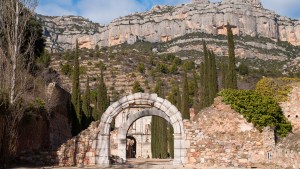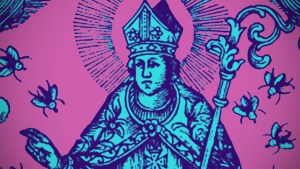Only the upper part of the original tapestry remains. In it, the story of Creation is told.
The Tapestry of Creation, also known as the Girona Tapestry, is housed in the Museum of the Cathedral of Girona. Originally the baldachin for the altar of the Holy Cross in the same cathedral (although some think it might have been used as a curtain, or even as a carpet), the tapestry is a Romanesque panel of needlework from the 11th century minutely embroidered with a series of theological scenes depicting the Biblical cycles of Creation and (to a certain extent) Redemption.
Measuring almost 4 x 5 meters (12 ft × 15.4 ft), the Tapestry of Creation is not exactly a tapestry. It is actually a large panel of couched needlework laid down on the surface of a ground fabric –a terracotta wool in different colors, with wool and white linen threads.
Interestingly, the frames of the Tapestry of Creation (which is rather deteriorated) contain smaller square pictures. Most scholars agree when saying this is a later addition, due to its Byzantine (and not Romanesque) style and themes.
Only the upper part of the Tapestry of Creation remains. This part, though, is divided into three other parts –or, better said, cycles:
- The Genesis, which is presided over by the Christ Pantocrator
- The cosmic elements (including months and days)
- The Story of the Holy Cross (in fact, Helen of Constantinople is clearly depicted in it, as she is credited with finding the True Cross and taking it to Europe).
The Christ Pantocrator, depicted as a beardless young man (in clearly Alexandrine, not Byzantine fashion), occupies a circle in the center of the tapestry. He is surrounded by a circle whose sectors (aside from the upper one, in which the Holy Spirit is represented as a white dove) show the seven days of creation, even depicting Adam and Eve.
In the central upper square of the Tapestry of Creation we find an old man representing “secular time” (Annus, literally “the year”) holding the Wheel of Time in his left hand. The other squares include personifications of the Rivers of Paradise, the Four Seasons, Samson, and another biblical character believed to be Adam. The two lower corners of the remains of the Tapestry of Creation include the personifications of the Sun (symbolizing Sunday) and the Moon (symbolizing Monday).
At the bottom, incomplete scenes of the discovery of the Holy Cross feature Helen of Constantinople in Jerusalem, and the transit of the True Cross as it is taken into Europe.


"creation" - Google News
November 11, 2022 at 02:43AM
https://ift.tt/vlxOfj2
The Tapestry of Creation: a medieval Iberian treasure - Aleteia
"creation" - Google News
https://ift.tt/yzUTZl7
https://ift.tt/iCY1jrL
Bagikan Berita Ini














0 Response to "The Tapestry of Creation: a medieval Iberian treasure - Aleteia"
Post a Comment